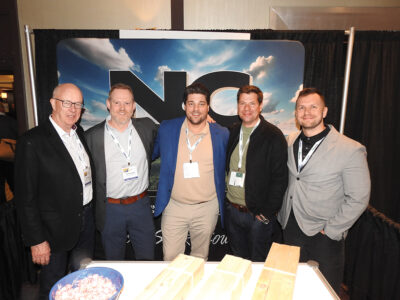(Editor’s note: Flexibility, resiliency, caring for employees – in the lumber industry, these traits have not been stifled by COVID-19’s march across the country. When we gathered the following comments, state governments were in varying phases of reopening. Regardless of the phase in respective states, those who thoughtfully responded to our survey were actively finding ways to define new markets in which to sell lumber while meeting the needs of loyal customers. While the consensus is that the future is uncertain as the pandemic continues today, there is room in our industry for optimism.)

Alden Robbins
Robbins Lumber Inc.
Searsmont, ME
At the sawmill, we’re using PPE and social distancing to ensure that our employees stay safe. They usually rotate work stations, so those are being cleaned thoroughly before each rotation. Outside visitors, such as truck drivers, are limited to certain areas.
The coronavirus has affected our business in other ways, too. Some companies closed completely so we couldn’t do business with them. Some provinces such as Quebec–which is a strong market for us–also were shut down quickly. We usually export much of our low-grade material, and that’s just now starting to come back.
On the other hand, the pandemic opened new markets for certain types of wooden goods, like coffins. In states where the distributors and retail lumberyards stayed open, we sold a great deal of our higher-end products.

Casey Roscoe
Seneca Sawmill
Eugene, OR
At Seneca, we are thankful for the opportunity this pandemic has given us to show our employees how important they are to us through our actions as opposed to our words.
Our owners have said time and time again that our employees are our most valuable assets. Without them, all we’ve got is a big bucket of bolts and a whole lot of trees. It is that spark of magic that they bring to work every day that breathes life into Seneca and makes it hum with energy and productivity.
The fear of this pandemic really hit home in late February when we had our first recorded case of coronavirus in Oregon. We knew our employees were feeling anxious. There was a run on canned goods, dry goods, and paper products in the grocery stores. Businesses closed. School was cancelled. There was an overall feeling of fear and uncertainty.
At Seneca, we were worried about the lumber market and our business, but our primary focus was on our employees. We wanted to let them know we were going to take care of them.
We decided to pay all of their health insurance (the part we usually pay and the part they usually pay) for the upcoming months. We knew it would cost us quite a bit, but it would give them peace of mind.
Demand for lumber dropped quickly and we had to curtail hours of production in our mills for a while so our sales team could have some time to sell the inventory we had on hand without adding to it. Even then, we brought employees in to do non-production tasks like power wash our buildings and put on a fresh coat of paint in order to keep them working.
We thought about our tradition of giving all employees turkeys at Thanksgiving and hams at Christmas. Although this situation was anything but traditional, with that same care in our hearts, we wanted to make sure they had the provisions they needed in their homes to keep their households running and food on their tables even as things were scarce in grocery stores.
We went to work procuring food and paper goods. Nothing was easy to procure, and we had to use multiple sources including reaching out to restaurant food wholesalers, butcher shops, and even going to multiple locations of big box stores to get whatever they had left on their shelves. Rice proved to be difficult since it could only be purchased in 50-pound bags, so we purchased the huge bags and assembled a team of employees to scoop it into gallon-sized containers for easier distribution.
When we had all of the provisions gathered, we made the announcement to our employees.
We communicated a number of ways internally and posted about it on Facebook as well so spouses would be informed.
We let them know that in that crazy time, we wanted to make sure they had some hard-to-secure basics at home, so we were giving bags of provisions to every one of them. The bags had toilet paper, a frozen chicken, frozen ground beef, rice, tortillas, pasta, and a couple of cans of food like tuna, soup, chicken or chili. We reminded them that we are
family, and we’d get through the situation together. We thanked them for being as incredible as they are and showing the tenacity and grit that they had displayed. We assured them we’d come through as a team even closer and stronger.
The day of the handouts, cars lined up and our executives, managers, and HR placed bags in cars of our grateful and resilient employees.
Then an unexpected thing happened. Employees and their spouses started thanking us. Some thanked us publicly on social media, while others wrote notes, letters, and emails of gratitude. Employees who are normally quiet and reserved sent beautiful and heartfelt communications, and spouses wrote to describe what it was like to sit at their dinner table with their family and the food we gave them and raise a glass to Seneca feeling thankful and secure in the knowledge that we will take care of them.
As the communications started coming in, we started a file to keep them. Each communication is a treasure to us.
Our company was founded by Aaron Jones in 1953 as Seneca Sawmill Company. We are now owned by his three daughters. We are a female-owned family company and we have grown over the years to have 168,000 acres of timberlands that we manage sustainably, four world-class sawmills, and a biomass facility where we use our scraps from the milling process as fuel to create enough green sustainable energy to power 13,000 local homes.
We have not only grown in scope, but also in the size of our workforce. Whereas we had 25 employees our first year, we now have 470 employees. Regardless of our size, we have been operating with the same core values for more than 60 years. Our employees are number one, and we protect and take care of them in bad times and thrive together in good times.
There is a saying that life is 10 percent what happens, and 90 percent how you react to it. We are happy to report that although we can’t control almost anything in relation to the current pandemic, we can live out our values through our actions. We value our employees and they know it. Not because we told them, but because we showed them.

Steve Banahan
Pleasant River Lumber
Dover-Foxcroft, ME
We export Eastern White Pine mainly to Pakistan. The port of Karachi is closed now because of the coronavirus, so exports have stopped. On the domestic side, we are running all mills at full speed, and sales are 60 percent of normal.
About half of our customers have come to a halt on new business. Prices are depressed because demand has dropped. As states reopen for business, we are seeing more business. The pipeline is dry, so any new demand requires some new POs to be pulled out of the lockbox.

Ryan Furtado
Furtado Forest Products Ltd.
Port Coquitlam, BC
In early April, I would have said that COVID-19 has slowed our business and that many distributors were fearful about what business would look like another month down the road. But today we’re seeing a large influx of business generally targeting toward the DIY sector. That’s because with so many people working from home, there has been a large increase in do-it-yourself projects. And many DIY projects are completed with our company’s primary species–Western Red Cedar. Due to this spike in demand, we have seen increased pricing pressure on selected sized timbers, mostly 2-inch rough dimension.
Naturally, production is slower than usual this time of year but this is fully due to COVID- 19. As we see BC open back up in the coming weeks, we expect production to increase back to normal levels. At FFP, we pride ourselves on only selling to distributors. Any of our distribution customers who sell to the major big box stores have seen a large spike in demand over the last eight weeks. The forecast is for this demand to continue for the foreseeable future, especially as the weather throughout the country improves.
Furtado Forest Products focuses primarily on Western Red Cedar, but we also sell Alaska Yellow Cedar, Douglas Fir and Hemlock. We pride ourselves on selling mixed-species loads and on our ability to work with tough specs. Above all, we focus on putting our customers’ needs first.

Paul Ericson
Shelton Lam & Deck
Chehalis, WA
Coronavirus has forced the closure of job sites, which has delayed the production and delivery of those orders. Douglas Fir has been in greatest demand among our customers, who are mainly wholesale distributors. Most of them have reported decent business activity.
Depending on which state our customers are in, April was a mess only because construction sites were closed and deliveries of material stopped.
Timber prices are mostly flat in this area, but offerings are getting scarcer because of mill curtailments. We have not reduced production, and we remain fully staffed.

Gary Powell
Matheus Lumber
Woodinville, WA
As an essential business, we’ve stayed open through the coronavirus pandemic. While we’ve continued to supply projects that were already under construction prior to the COVID- 19 outbreak, the pipeline for future projects is uncertain. I would estimate that developers who are our customers have shut down between eight and 15 jobs because of the stay-at- home orders. Those constructing multi-family residential buildings want to wait and see what the economy is going to do because their typical renters, who work at places like restaurants and bars, are out of work due to mandated shutdown orders. Combine that with the uncertainty of the unemployment rate going forward, and you have a not-so-rosy picture.
Having said all that, we are supplying projects in 30 to 35 states, so the regional effect on our lumber business depends on what the governors have ordered. Business in Texas has been pretty good overall, but Houston has been really slow. Contractors have been able to continue work in Salt Lake City, UT, and business is pretty good in Montana. The biggest cities along the West Coast are a different story since the governors of those states have been more stringent in their shutdown orders. With many of these cities still not issuing new permits for new construction, one can expect a backlog of projects in certain areas getting started down the road.

Jamie Hursh
Richardson Timbers
Dallas, TX
Our business is down a little from this time last year, but there’s no way to know if that’s due to the coronavirus or other factors. I couldn’t go out and make sales calls for a while because of the pandemic, so everything was done over the phone. If I had to leave samples for a customer, I would put it on his doorstep and leave, then he would walk out and grab it.
Our customers are a mixed bag in terms of how COVID-19 is affecting them. In urban areas, like the Metroplex, the retail lumberyards are taking it very seriously. But if you get out away from the DFW market, it’s like nothing ever happened. If you get out far enough, the people don’t want to wear a mask and seem somewhat unconcerned about the Pandemic.

Bob Bortolin
San Group Inc.
Langley, BC
Our business is still good, but COVID-19 has caused a reduction in our travel to overseas customers. Customers have reported no major problems in dealing with the pandemic.
We supply a variety of Softwoods. Western Red Cedar is our highest volume, followed by Hemlock, Douglas Fir and Yellow Cedar.

Wayne Jordan
Neiman Enterprises
Hulett, WY
Our business has been very strong, which is the exact opposite of what we expected going into the stay-at-home orders and shutdown of non-essential businesses.
Customers have taken many different approaches to their businesses to adhere to social-distancing recommendations. Although many aspects of their business have been affected, they have taken it in stride and haven’t missed any business due to their modifications. u

Ike Padgett
Tindell’s Inc.
Knoxville, TN
We were preparing ourselves for a 30 to 50 percent slowdown because of the coronavirus, based on information we received from our peers in the industry from various areas. We lowered inventory considerably, and spoke with many of our customers who also were prepared to slow down or shut down for a period of time due to COVID-19 concerns.
All tract builders scraped any plans to build specs for the foreseeable future, but had contract houses to build through summer. Any plans for our customers to slow down were disposed as subs threatened to find work from other builders. Therefore, our tract builders continued to pump out houses at considerable rates. In short, we are seeing about a 10 percent decrease versus last year, but we are right in line with our projected numbers.
We typically direct our marketing to the professional contractor. We do very little walk-in/DIY business because it does not fit in our business model very well. However, once the big-box stores ran out of treated Southern Yellow Pine lumber, we began to see volume increase considerably. It is a good thing that we have a 30+ year relationship with our vendor, but it could only handle so much of a volume increase. I had to institute an executive order that we are only to sell treated lumber to our account customers.
The only financial impacts from COVID-19 so far would be from the additional precautions we are taking to protect our employees. We have invested in temperature stations and thermometers where we can monitor body temps on a regular basis. We installed sneeze guards at all of our counters, and we buy more than budgeted in disinfectants and cleaners that kill the COVID-19 virus, hand sanitizers, and soaps. Thank God that we have not had a case within our company. We intend to keep it that way. We spent some extra money on VPN licenses and spent about a month working from home to comply with the governor’s
stay-at-home order. I’m sure there have been some financial impact on sales, but that is difficult to quantify because we felt like we were due for a slowdown in our area regardless. Higher lumber prices are actually buoyant to sales and profitability. Most supply has been constrained as mills have had to take downtime due to COVID-19 issues. With robust
demand and limited supply, we have had considerable price increases in materials over the past two months.
Editor, Marketing Consultant, and Third generation publisher. With Miller Wood Trade Publications since 1983.
- Terry Millerhttps://millerwoodtradepub.com/author/terry-miller/
- Terry Millerhttps://millerwoodtradepub.com/author/terry-miller/
- Terry Millerhttps://millerwoodtradepub.com/author/terry-miller/
- Terry Millerhttps://millerwoodtradepub.com/author/terry-miller/










